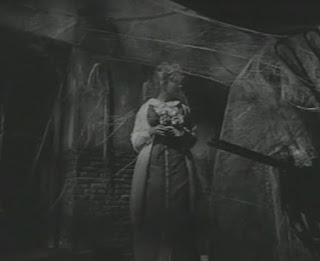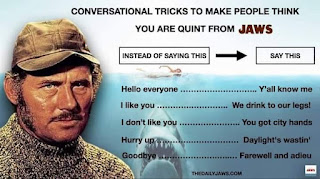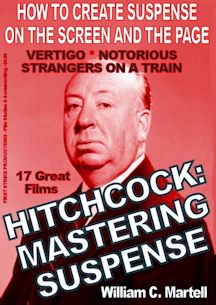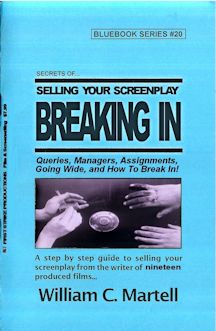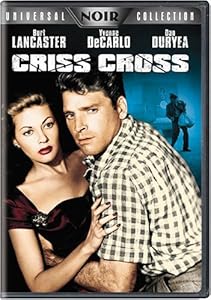The spider web fills the screen, it's Boris Karloff's THRILLER!
THRILLER: The Closed Cabinet
Season: 2, Episode: 10.
Airdate: November 27, 1961
Director: Ida Lupino
Writer: Kay Lenard & Jess Carneol.
Cast: Olive Sturgess, David Frankham, Jennifer Raine, Peter Forster, Patricia Manning.
Music: Jerry Goldsmith
Cinematography: Benjamin H Kline.
Producer: William Frye.
Boris Karloff’s Introduction: “Evil begats evil. And the evil does not die. The sins of the fathers doom the children through generations yet unborn. Impossible, you say? The superstition from the dark ages. Well, perhaps our story tonight will help you change your mind. We start with a curse and a riddle, inexplicabily bound together. Somewhere in this room lies the clue that will solve the riddle and lift the curse. But 300 years have passed since Dame Alice pronounced that awful curse, and still the riddle is unsolved. Tonight we are concerned with two brothers - the last of the cursed Mervyns and the women who love them. Our players are: Olive Sturgess, David Frankham, Jennifer Raine, Peter Forster, and Patricia Manning. Turn off your lights. Close your windows. And even of the wind should rise, relax... if you can! While we pick up our story in the year 1880, during the reign of her gracious majesty Queen Victoria, and when our tale is told, you’ll believe in curses as sure as my name is Boris Karloff.”
Synopsis: A dark and stormy night. 1580. Lady Beatrice (Patricia Manning) discovers her abusive husband Hugh Mervyn is drunk, and using a dagger found in a secret drawer, murders him and then herself. The bodies are discovered by a Maid (Myra Carter), who finds the dagger next to Beatrice’s corpse and screams... Dame Alice (Doris Lloyd) comes running, takes the dagger from the Maid and then spots her son murdered on the bed... and puts a curse upon the family: “Out of evil comes death! In each generation there shall be a Mervyn who will bring shame and death to the family, for eternity... An end there shall be, but it is beyond the wisdom of man to fix it, or the wit of man to discover it. Who fathoms the riddle, lifts the curse. Pure blood, stained by the blood stained knife, heals the Mervyn shame, ends the Mervyn’s strife,” she says as she returns the dagger to its secret compartment.
1880: The Mervin Castle. A coach pulls up and Evie Bishop (Olive Sturgess) steps out and is welcomed by her cousins Lucy Mervyn (Jennifer Raine) and George Mervyn (Peter Forster) and enter the castle... where handsome Alan Mervyn (David Frankham) descends the staircase and takes Evie in her arms. Alan lives in London and avoids the castle completely, but when he heard that Evie was coming to visit he braved a stay. Eveie has heard that the castle is haunted, that there is a room in the castle that is filled with ghosts... and she would like to stay there. She has never seen a ghost. As she jokes about ghosts, George and Lucy look very uncomfortable. Evie insists on staying in the haunted room, and when Lucy shows her to the room, the two men seem less than happy.
In the “haunted room” (from the opening scene) Lucy tells Evie that several Mervyn relatives have died violent deaths in this room - which would account for the ghosts. The cabinet (where the dagger is hidden) is still there, and Lucy jokes about the legend of the curse. Though there have been a bunch of deaths in this room, Lucy believes it is due to the Mervyn men’s anger issues.
Alan and George have an argument - Alan believes that the curse is real, and staying in this castle is putting Lucy’s life at risk. George believes it’s just hokum - sure, there have been a lot of murders in the family, but whose family hasn’t had them?
As Evie looks around the castle, candles flicker where there is no breeze... and she sees the ghost of Lady Beatrice for a moment. Then the ghost vanishes. When Evie heads downstairs for dinner, she hears the two men arguing and listens in. When George leaves, she comes downstairs and talks to Alan - it’s love!
When George and Lucy come in, Evie asks if their houseguest will be joining them? Who? The woman upstairs. The ghost!
After dinner, Alan takes Evie on a tour of the castle’s hallways to look at the paintings of the family - stopping at Lady Beatrice. That’s the ghost she saw!
A dark and stormy night... awakens Evie. Blows open the windows. She gets up and closes them, and when she goes back to sleep the ghost of Lady Beatrice pops up in a doorway. Trying to communicate with her. Warning her that she is the next victim of the curse?
The next morning when Evie mentions the storm, she gets funny looks: there was no storm. Is she crazy? Alan takes Evie on a tour of the castle grounds, and she tells him that she wants to solve the mystery of the curse so that Alan will feel comfortable in his home. Evie wants to see the dungeon (doesn’t everyone?), but the door is locked to When Alan goes to get the key... the door magically opens as soon as he is gone. Nothing haunted about that at all.
Evie goes in alone - lots of cobwebs down here, but none get on her face. She manages to completely avoid all of the webs and maintain her perfect hair. Doors open one-by-one in front of her, taking her down to the crypt... where she comes face to face with Hugh Mervyn! Well, a bust of him. And finds a cat-o-nine-tails *whip* on his coffin. What’s that all about? Deeper in the crypt she finds a secret room with Lady Beatrice’s coffin... and Lady Beatrice’s ghosts makes an appearance and points at Evie. That’s when Alan runs in, and the ghost vanishes. But was the ghost pointing at her or the wall behind her? On the wall, and inscription under the cobwebs: “Where woman sinned, the maid shall win. But God help the maid who sleeps here-in.” Alan tells her that no one in the family ever knew where Lady Beatrice’s coffin was. No one had ever discovered this secret room until now.
George, with a riding crop in hand, tells Alan and Evie that they could not have found Lady Beatrice’s coffin - no one has found it for 300 years. Men in the family have looked for it and never found it, so how could Evie have found it? George loses his temper... and we get some angry exposition about how Lady Beatrice’s ghost appeared to their mother the night before she died... and now Lady Beatrice has appeared before Evie. George loses it and almost whips Alan. George’s temper is out of control! He storms out of the room.
Alan drops a few pages of exposition on Evie about the curse... and how Hugh was physically abusive to Lady Beatrice until she killed him one night during a violent storm. The storm that was brewing inside her for all of those years of abuse by a drunken husband?
That night, as Lucy plays the harp and George naps, Alan and Evie flirt... and then he sees her to her room like a gentleman... and they almost kiss. Victorian romance at its hottest! I believe this moment was put there to show that Evie was still a virgin - pure - and therefor able to lift the curse. But it’s not set up very well, and we don’t particularly care if they kiss or not - which is a mistake.
Evie does not go to bed - she sits up, waiting for the storm to come. The storm waiting or the storm without? When it comes, it blows open the windows violently. Meanwhile, Alan looks outside his window - no storm, clear skies. This is a nice moment because it shows that the haunted room really is haunted. Evie goes to sleep and the storm blasts the windows open again... and Lady Beatrice appears. She raises her hand to beckon Evie... and Evie is back in time, drunk Hugh Mervyn sleeping in the bed she just got out of. Lady Beatrice points to the cabinet, and Evie finds the secret lever to open it... And takes out the dagger! She is possessed by Lady Beatrice!
She moves to the bed, where Hugh is sleeping, raises the knife and... stops herself from stabbing him, but slices her hand in the process. She shows her bleeding hand to Lady Beatrice’s ghost, “The maid has won,” and the ghost vanishes, leaving Evie alone in the room. The bed is empty. The storm is gone.
She runs out into the hallway, yelling for Alan. He runs from his room and they embrace in the hallway. She tells him what happened, shows him her hand... and there is no blood on her hand. He thinks it might be a nightmare, but she convinces him that she has lifted the curse. In the haunted bedroom, she tells him how to open the drawer... and he finds the dagger with Hugh Mervyn’s crusted blood on it... and another drawer opens and there is a scroll with the curse and, heck, Evie did it and lifted the curse! So he finally kisses her. They can be married with very little chance that he will physically abuse her and maybe even kill her during an argument!
Review: The luck of laziness! I had intended on writing up all of these entries a couple of years ago, and had I done that I’m not sure I would have seen the subtleties in this episode or commented on them as much as will now that we’ve had the MeToo Movement. Though domestic abuse is not the same as inappropriately touching someone, they both fall under the umbrella of ahole male dominance. Though this episode doesn’t really work, I’m cutting it some slack because it’s “a very special episode pf THRILLER”, just like the alcoholism episode. It’s 1961 and domestic violence is a major problem in America (Time Magazine would do an article on the epidemic a couple of years later) and this episode is going to slyly get the message out disguised as a ghost story.
I’m sure that Ida Lupino was hired to direct this episode to give it a woman’s sensibility, but it is not one of her better episodes. I think the screenplay may be getting in the way - but I wonder about the lead actress. The scenes where she *avoids* the cobwebs just seem odd - did the actress not want to get messy? Or was that seen as “degrading” to a female and not done in this episode? Either way, it removes the spooky element from the haunted house story. One of the elements of horror is the “Eeeew!” Factor. If you think of all of those moments in horror movies where you have went “Eeeeew!” mentally (or even outloud), that feeling of revulsion is one of the things that add to the dread and creepy feeling of the film. In horror movies people *touch* gross things and *step in* gross things and *back into* gross things and maybe even sit in gross things. Horror movies are filled with rats and bats and worms and corpses and all kinds of gross things that the characters encounter. There are things that look as if they smell bad in horror films. Things that get on your hands that you need to wash off *now*, but you are miles away from running water. Horror movies put their characters through hell - even the survivors - and that is part of what makes them work, and what makes the survivors strong.
But for whatever reason, here we remove the revulsion and end up with a lead character who just wanders through a haunted castle and easily pushes aside cobwebs as if they are curtains dividing rooms. If someone thought that the women in the story have gone through enough abuse at the hands of their husbands that they needed to avoid abusing them with cobwebs, that was a mistake. It actually weakens a character if they don’t have to go through hell.
I have noted the used of cobwebs and spider webs in earlier episodes, and how sometimes they are just a piece of the background and sometimes there are the focus of the scene. Revulsion is a “no budget” special effect that packs a punch, so you want to make cobwebs part of the scene - something that can not be avoided. So removing the revulsion was a mistake - no matter what the reason.
Lupino does get a few of her creative shots in - and that’s one of the reasons why I love her in low budget films and TV work. Other directors will just do wide shot and close ups - coverage - but she gets those Hitchcock shots in there. Here we have a couple of great early shots - a nice shot through the coach windows as Evie arrives at the castle, and a creepy paranoid shot from a balcony above as Alan watches her enter the castle’s main room. Later in the episode is a great moving shot as the group relaxes in the castle main room at night, it circles them like a Brian DePalma shot. And there is a cool shot *through* the harp at George and Lucy. I suspect with so many locations, there wasn’t time for much else, and the rest is competently directed. I wish she had done more in the creepy dungeon and crypt scenes, but it’s TV. Made on a schedule with a hard deadline. They are okay.
One of the other problems with the episode is Jennifer Raine’s decidedly non-British accent. She has some sort of Southwestern twang, and every time she opens her mouth it takes you out of the episode. Though the others don’t go full-on-British accents, they have that mid-Atlantic sound that Americans can understand but still sound vaguely British.
Though I give kudos to the script for taking on an issue, the story is muddled and the curse and riddle are just a mess. Even after watching it several times, I’m not sure that either actually makes sense. And a clue to understanding the curse ends up written on a wall in Lady Beatrice’s tomb, but this is all still confusing. Too many moving parts to the curse. Too many foot notes. Instead of being something simple (and rhyming) it’s so convoluted you need to take notes through the episode... and even though I did that I’m still confused by it! The reason for the curse also is muddled - the mother of the murdered abuser curses her own family line? There was a better way to do it - having Lady Beatrice curse the family as she is being killed by her husband, but maybe the censors said no to that?
I do like that the curse of domestic abuse is “handed down” from father to son in this story. George’s anger issues are seen as the family curse. But that scene where he has the riding crop in his hand really needed to create suspense and fear that he might use it on his wife, and not in a kinky way. Again, that may have been a censors thing - we don’t want to offend all of the wide beaters in the audience! We need to protect our ratings!
So this episode isn’t very spooky or scary, even though it takes place in a nice haunted castle. Next episode works better - a “weird tales” story about people who communicate with the dead... and the dead aren’t happy with what is going on in the world of the living!
- Bill












